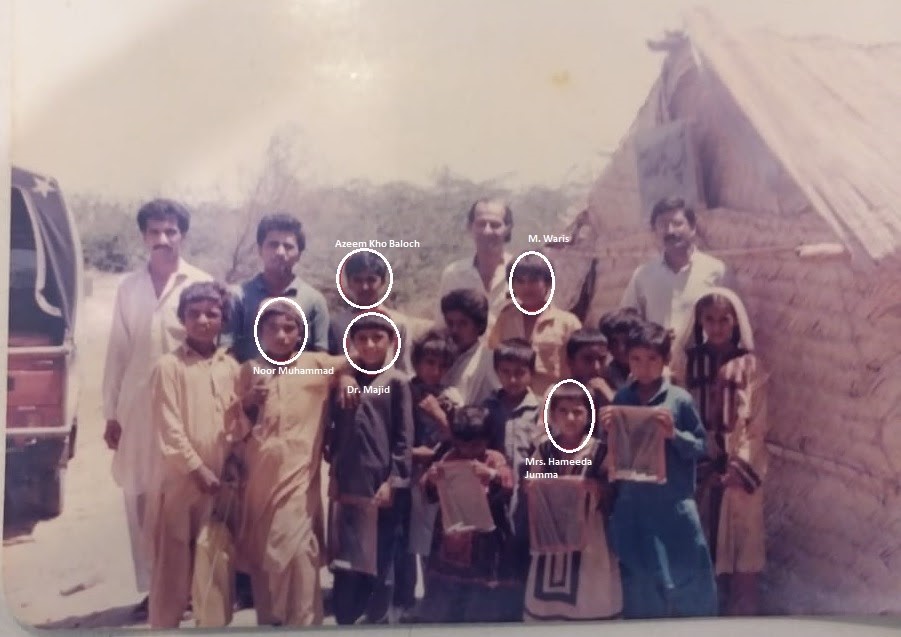The Jhuggi School: A journey of belief and dedication
JUNE 4, 2020
What do you think would happen if you entered a village, which you neither belonged to nor had any connections with, and asked someone to give you a portion of their land to open a school that provides free education? You would assume they will decline? Perhaps we do not know because we never tried. There was, however, a man from Karachi who was trusted with 500 yards of land by a villager in Balochistan in their very first meeting.
The Lyceum community has known this wonderful person as Yaseen Bhai for the past 33 years. When you are stressed over the logistics of an event, his classic “Sir, Marriott wala set-up hogaya hai” is bound to bring a smile to your face. Everyone at the school has their own unique relationship with him, involving great warmth and humour. He is the master of theatre society and at the heart of community service programme. Yaseen Akhtar Bizenjo is an institution in himself; he started working for his community while he was still studying in grade four. He said, “It’s strange that even though I have not received any degrees myself, I have just always felt very strongly about people having access to education. I want to see them studying and learning.”
Back in 1990, he directed a German play with the Lyceum students, “Sheeshay ki Dhaal,” at Pakistan American Cultural Centre (PACC). The ticket for the play at the time was 11 rupees, out of which 1 rupee went for Excise tax and had them left with 10 rupees per attendee. After deducting the expenses from their revenue, they made a total of PKR 7,000. He went with that amount to the Principal and said he wanted to start a jhuggi school in some village. She asked no further questions and asked him to go ahead with what he wished for.
He then set his journey and began the search for a village in the outskirts of the city. He mentioned that he specifically wished to find a village because there were already schools being developed around the city for children belonging to lower socio-economic classes. He searched around and beyond Malir, near the villages of Hawke’s Bay beach; but there was no luck, no one was ready to offer him a space. He continued his search for another month until he reached the Hub River Road, Balochistan. There he met someone named Nizar Muhammad, who owned 150 acres of land and offered him a small area next to his mansion but Bizenjo objected. His vision could not be restricted to just educating Muhammad’s children since he wanted the school to be for the benefit of the larger community.
Getting another rejection, exhausted in the heat, covered in dust, he took his motorcycle to a small hotel on the main river road for the evening cup of chai. A man came and sat next to him, asked if he was from Karachi and if everything was okay. Bizenjo told him he wanted to open up a school for the children in the village. The man said not to worry and asked to follow him. He took him 12 kilometers ahead to another village and introduced him to a man named Raza Muhammad, who owned a large portion of the village. Using the stick in his hand, he marked an area of 500 yards and said to Bizenjo, here is your land, start your school. Three men, who knew nothing about each other, made a property deal with no evidence or paper-work, just simple trust and honesty.
He came back ecstatic and shared the news, “Baji, zameen milgayi!” He collected basic materials such as chatayi and moora, to take back to the village and set-up the school with the help of a few others within three days. He also had the support of young Lyceum students; Ali Tawawala, Shemit Shameen, Sharjeel Raza, Alia Ahmed, and Temina Kazmi who volunteered to work for the project. The school started with thirteen children from around the area, and now has the strength of seventy students. He managed the school for ten years, after which he was approached by two government officers, who acknowledged the tremendous work he had been doing and proposed to adopt and develop the school further. Bizenjo was delighted but set three conditions before he agreed – the school’s name would remain the Jhuggi School; a permanent job with salary to the villagers who taught at the school; bring a professional from Karachi for teacher training. They agreed to his conditions and the deal for transfer was made. He continued to visit the school and contribute in whatever way he could.
He recently received a call from Majid, who was among the first thirteen students when the school first began, he said, “Yaseen bhai mein tou doctor ban gaya,” and is currently working with the Covid-19 patients. He told him about the other students who went for higher education and are now working at different organizations. Azeem koh Baloch is the Area Director EFU Insurance Company, Hameeda Juma did her L.L.B and is working as an Advocate in the Hub Industrial area, Noor Muhammad Baloch is the Director Social Security, Balochistan, and Mohammad Waris is the Health Officer at the Social Security department.
The Jhuggi School today has well-built classrooms, bathroom, and a courtyard. The student body has a mix of religious and ethnic backgrounds. The school offers education till grade eight, after which students move towards Gaddani, which is located in the southern part of Balochistan for further education. The foundation of this school was laid with ambition and trust, while it has continued to grow with compassion and nurturing relationships.

